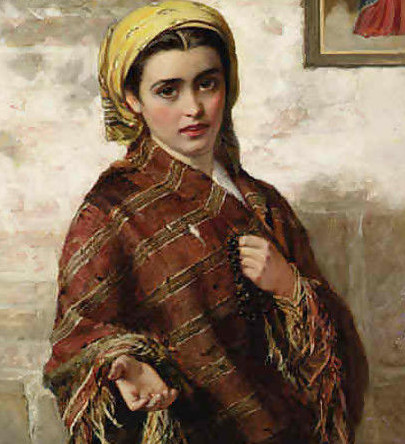Content warnings for this story (click here for guide):

Nobody had expected the rebellion to succeed. Not the rag-tag bunch behind it, nor the castle goons they had overpowered, and certainly not the illegitimate ruler, Lord Deveraux.
A decade prior to these events, the town of Carbaston had been unique in the kingdom: a self-governed settlement in which people farmed, built and traded between themselves. The population was made up of former tenant farmers who had each saved enough money for their own plot of land, and who had come together to work on their own terms. Several generations later, Carbaston was well established as a thriving egalitarian area, with a healthy community and as many female landowners as male.
Lord Elland Deveraux had seized power over Carbaston one day in winter. Stinging and short on money after his own father had disinherited him, the vicious noble had eyed up the remarkable town for some time. It was a resource-rich area full of workers with no rival lord in charge. Deveraux took exception to the absence of a ruler – the arrogance of these illiterate bumpkins, thinking they could govern land better than those born to the role! No, that would have to be remedied.
Gathering together the last of his loyal retainers, the young Lord had struck the peaceful Carbaston at night, slaughtering the council of elders who helped adjudicate disputes in the town. He had captured some materials and money as ‘tax’, declared Carbaston a treasonous keep in its attempted segregation from the crown, and written to the king to claim his land. The king, surprised that there was a patch of the country over which no Lord, and hence he as their ruler, had sway, agreed to the takeover and arranged for a nearby mansion of his own to be given to the new lord in exchange for his loyalty.
Soon Deveraux and his acolytes were fully installed, and set about mining Carbaston and its people for all the resources it held. These ranged from materials, food and money to young women and men, who would be escorted to the mansion for the enjoyment of the Deveraux soldiers. None of the young people would ever share what they had been made to do at the mansion, but their routine abuse, coupled with the fierce taxation, ensured the settlement became a miserable, downtrodden place, in fear of repercussions and random cruelties.
For all of this, the people of Carbaston agreed among themselves that they would never, never pledge their loyalty to the false lord. When his messengers tried to force their hand to paper, they pretended they could not write, and when threatened with death, swore an oath of allegiance on a god in whom they did not believe. This solidarity was almost universal among the people, and helped keep them together, sowing the seeds of the rebellion.
Almost universal, but not quite. Anna, the blacksmith’s daughter, watched in disgust as her childhood playmate, Beatrice, who had carried round milk from her father’s small herd, betrayed them all.
Lord Deveraux would stride round the town with his entourage, pointing out things he wished to have for himself, at which point his soldiers would acquire it for him from this or that protesting pauper. After the first few executions, nobody complained when they were approached.
Anna had watched Beatrice grow up from a sweet child to a sly teenager, skilled in manipulating boys to give her things and even thieve for her. Now she watched as Beatrice, 19 by this point, shamelessly approached the Lord’s horse.
“Pretty thing, isn’t she?” she said, batting her lashes sweetly at the master. “I’ll wager she goes very well if you whip her hard enough.”
Lord Deveraux looked down with interest. Beatrice had woven flowers into her hair and loosened the front of her linen blouse so her pale breasts could be seen.
“Of course,” said Beatrice, “I expect you must treat her well in order to get her best from her. Many expensive treats, eh? A partner for life.”
She stroked the horse’s neck then turned and walked away, looking back over her shoulder at the intrigued Lord.
“If you should like some creamy milk, my Lord,” she offered, giving him her most innocent look, “I can bring some to your house.”
“I should like that very much,” said the lord, looking lasciviously at her fine hips and rump as she strutted away.
Beatrice did indeed take a can of milk to the mansion. And the next day. And the next. And after a week, she no longer returned the village, for they were engaged.
The wedding was held in the grounds of the mansion and everyone from Carbaston was required to attend. Beatrice’s father did not walk her down the aisle; even if he had wished to, he would have refused. Instead, she strutted toward her bridegroom alone, wearing a lavish gown of raw silk, dripping with jewels. As she passed the townsfolk she had known in her old life, she did acknowledge a single one.
At the celebratory dance following the ceremony, Anna caught up with her old friend while her new husband was distracted.
“Beatrice, are you mad?” she said, shaking with anger. “This man murdered Elder Wells, Elder Patton – so many people! He has taken our town captive and holds us all to ransom with taxes! He has his soldiers defile whichever pretty souls they wish and he keeps us all prisoner, where once we were free! What happened to the town accord? We all hold firm. We swear by nothing! We spit in his ale! How could you do this?”
Beatrice turned to Anna with the air of a queen at court. She wrinkled her nose.
“Do please let go of my sleeve. It’s imported and rather expensive. I’d sooner not get anvil smuts all over it.”
Anna seethed.
“Who do you think you are? The Empress of Carbaston? You were a stinking cowherd, which was at least an honest job. Now you’re a kept whore in expensive clothing!”
Beatrice smirked nastily. “And you’re a grubby little smithy’s girl, who’s jealous she didn’t win the one man with any power around here. I intend to live my life in comfort, as Lady Deveraux. As far as I’m concerned, I have no father. And just for the insult –“
She clapped her hands and two guards appeared.
“This little wretch,” she explained, gesturing at Anna, “called me a most hurtful name, and besmirched my reputation. Meaning she has also injured my husband’s good name.”
“Damn you!” shouted Anna. “You filthy traitor!”
“So common,” said Beatrice, piously. “It’s not her fault. She has the manners she was born to. Still, I should greatly appreciate it if you would strip and whip her as an example to others.”
“As you wish, my lady,” said one guard, grasping Anna’s arms as she struggled and shouted. A second guard sniggered and used his knife to rip her plain, patched dress – the best one she owned.
“No! Let me GO!” screeched Anna, kicking furiously and trying to cling to her clothes. But it was too late. Her dress fell away, revealing her bare breasts, as the townsfolk gasped and the soldiers whooped. Anna was held down on a stone pillar by one guard as her drawers were taken down by a second. One of the soldiers handed a leather strap to the second guard, and he gleefully set about strapping her shivering little bottom.
“Nooo! AHH! Beatrice Streeter, you bitch! You treacherous cow!” wailed Anna, as thick red bands rose on her jiggling cheeks. Beatrice and her Lord smirked at the entertainment.
“What a spirited little sow! Listen to her squeal!” laughed Lord Deveraux, and his new bride guffawed, tossing her cup of wine over Anna’s head.
The burning blows landed and landed, with loud, fleshy slaps. Anna thrashed and wept in her captor’s grip as her bottom was punished. Broad welts rose to turn her hind quarters scarlet and she feared she might pass out.
Finally a servant came to inform Lord Deveraux that the banquet was ready. Beatrice yawned and waved at the guard to stop Anna’s punishment.
“Send this filthy little slut back to the town,” she said. “I shall not feed her. Let her hobble back in her rags and go eat her usual swill.”
Anna sobbed in pain and humiliation, as her father came over, distraught, to cover her with his threadbare coat.
“I wouldn’t do that,” said one of the guards. “Unless you wish to see her flogged as well. My lady has instructed us to send her back alone. Your presence is compulsory at the table. The penalty will be great for failing to attend.”
Anna’s father froze, unsure of what to do. But Anna moaned, “Go, father. I will rest. You must go, for both of us. Do not worry. I will not forget this.”
Her father hesitated, then saw his daughter’s steely glare. She had always been stubborn. He nodded and went inside.
Anna waited until all had gone, then stood up, wincing and wiping her tear-streaked face. She gathered her torn clothes around her and limped off home.

